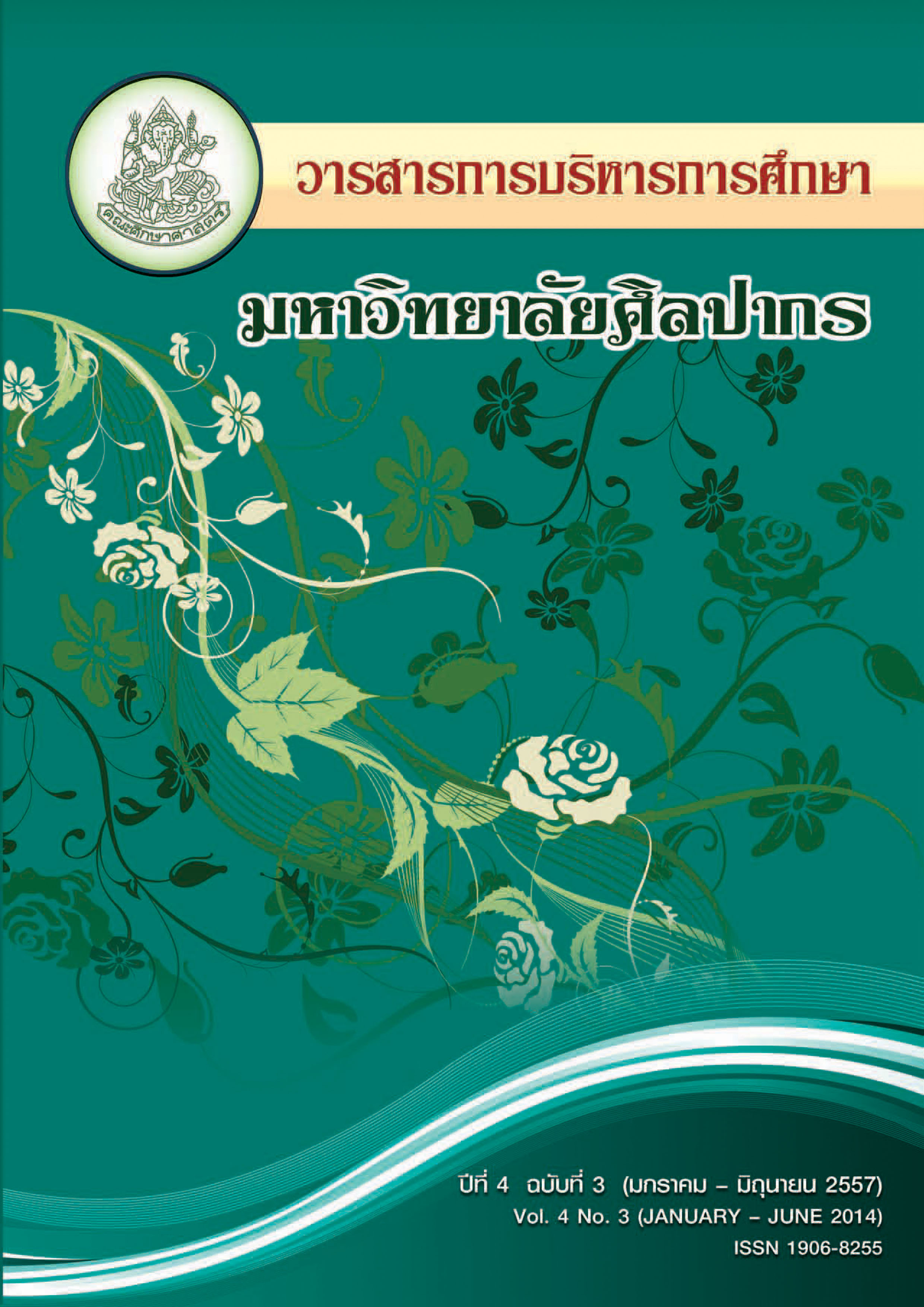การศึกษาบุญนิยมกับคุณธรรมพื้นฐาน 8 ประการ ของนักเรียนเครือข่ายโรงเรียนสัมมาสิกขา
คำสำคัญ:
การศึกษาบุญนิยม, คุณธรรมพื้นฐาน 8 ประการ, เครือข่ายโรงเรียนสัมมาสิกขา, Boonniyom Education, Student’s Eight Basic Virtues, Summasikkha Schoolsบทคัดย่อ
การวิจัยครั้งนี้มีวัตถุประสงค์เพื่อทราบ 1) การศึกษาบุญนิยมของโรงเรียนสัมมาสิกขา 2) คุณธรรมพื้นฐาน 8 ประการ ของนักเรียนเครือข่ายโรงเรียนสัมมาสิกขา 3) ความสัมพันธ์ระหว่างการศึกษาบุญนิยมกับคุณธรรมพื้นฐาน 8 ประการของ นักเรียนเครือข่ายโรงเรียนสัมมาสิกขาและ 4) แนวทางการพัฒนาการศึกษาบุญนิยมกับคุณธรรมพื้นฐาน 8 ประการของนักเรียน เครือข่ายโรงเรียนสัมมาสิกขา กลุ่มตัวอย่างในการวิจัย คือ คณะกรรมการสถานศึกษา ผู้บริหารสถานศึกษาหรือรองผู้อำนวยการ หรือผู้ปฏิบัติหน้าที่แทนรองผู้อำนวยการและครูของเครือข่ายโรงเรียนสัมมาสิกขา จำนวน 165 คน เครื่องมือในการวิจัยใช้ แบบสอบถามเกี่ยวกับการศึกษาบุญนิยมของโรงเรียนสัมมาสิกขา ตามแนวทางพัฒนาการจัดการศึกษาบุญนิยมของโรงเรียน สัมมาสิกขาปฐมอโศก ปีการศึกษา 2554-2556 และคุณธรรมพื้นฐาน 8 ประการ ตามนโยบายเร่งรัดการปฏิรูปการศึกษา ของกระทรวงศึกษาธิการและการสัมภาษณ์แบบมีโครงสร้าง สถิติที่ใช้ในการวิจัย คือ ค่าความถี่ ค่าร้อยละ ค่ามัชฌิมเลขคณิต ส่วนเบี่ยงเบนมาตรฐาน การวิเคราะห์ค่าสัมประสิทธิ์สัมพันธ์ของเพียร์สันและการวิเคราะห์เนื้อหาผลการวิจัยพบว่า
1. การศึกษาบุญนิยมของโรงเรียนสัมมาสิกขา ภาพรวมอยู่ในระดับมาก เมื่อพิจารณาเป็นรายด้านพบว่าอยู่ในระดับมาก ที่สุด 3 ด้าน อยู่ในระดับมาก 4 ด้าน
2. คุณธรรมพื้นฐาน 8 ประการของนักเรียนเครือข่ายโรงเรียนสัมมาสิกขา ภาพรวมและรายด้านอยู่ในระดับมาก
3. การศึกษาบุญนิยมกับคุณธรรมพื้นฐาน 8 ประการของนักเรียนเครือข่ายโรงเรียนสัมมาสิกขามีความสัมพันธ์กันอย่าง มีนัยสำคัญทางสถิติที่ระดับ .01 เมื่อพิจารณาเป็นรายด้าน พบว่าการศึกษาบุญนิยมของโรงเรียนสัมมาสิกขา มีความสัมพันธ์กับ คุณธรรมพื้นฐาน 8 ประการของนักเรียนเครือข่ายโรงเรียนสัมมาสิกขาด้านขยันมากที่สุดและด้านสะอาดน้อยที่สุด
4. แนวทางในการพัฒนาการศึกษาบุญนิยมกับคุณธรรมพื้นฐาน 8 ประการของนักเรียนเครือข่ายโรงเรียนสัมมาสิกขา ได้แก่ 4.1) พัฒนาจิตวิญญาณ ความรู้ ความสามารถและทักษะอื่นๆ ที่จำเป็น แก่บุคลากรที่เกี่ยวข้อง โดยเน้นพิเศษในบุคลากร ที่ปฏิบัติหน้าที่ครูผู้สอนและผู้ดูแลนักเรียน 4.2) พัฒนากระบวนการเรียนการสอน จัดสภาพแวดล้อมที่เชื่อมโยงบูรณาการกับ ประสบการณ์จริงในวิถีชีวิตที่เอื้อต่อการพัฒนาคุณธรรมของนักเรียนและ 4.3) พัฒนาการมีส่วนร่วมของผู้เรียนในการจัด กิจกรรมพัฒนาผู้เรียนและกิจกรรมพิเศษของโรงเรียน
BOONNIYOM EDUCATION AND STUDENT'S EIGHT BASIC VIRTUES OF SUMMASIKKHA SCHOOLS
The purposes of this research were to find : 1) Boonniyom Education of Summasikkha Schools, 2) student’s eight basic virtues of Summasikkha Schools 3) the relationships between Boonniyom Education and student’s eight basic virtues of Summasikkha Schools 4) the development approach for Boonniyom Education and student’s eight basic virtues of Summasikkha Schools. The sample were school board committees, school administrators or assistant school director or deputy directors, and teachers in Summasikkha Schools; with the total of 165. The research instruments were a questionnaire regarding Boonniyom Education, based on the Development Approach for Boonniyom Education management of Summasikkha Pathom Asoke School (academic year 2011-2013) and student’s eight basic virtues, based on intensive education reform policy of The Ministry of Education; and structured interviews. The statistics used in data analysis were frequency, percentage, arithmetic mean, standard deviation, Pearson’s product – moment correlation coefficient, and content analysis.
The finding revealed as follow :
1. The Boonniyom Education of Summasikkha Schools, as a whole, was found at a high level; when considered each aspect, 3 aspects were found at the highest level and 4 were found at a high level.
2. The student’s eight basic virtues of Summasikkha Schools, as a whole and as an individual, was at a high level.
3. The relationships between Boonniyom Education and student’s eight basic virtues of Summasikkha Schools was found at .01 level of statistical significance; where considered each aspect, Boonniyom Education and student’s eight basic virtues of Summasikkha Schools : diligence, was correlated the most, where as cleanliness was correlated the least.
4. The development approach for Boonniyom Education and student’s eight basic virtues of Summasikkha Schools : 1) develop soul, knowledge, ability and necessary skills of school personnel, especially those who are in charge of teaching and taking care of students, 2) develop instruction process and learning environment that facilitate students’ virtue, 3) develop students’ involvement in learning and school activities




